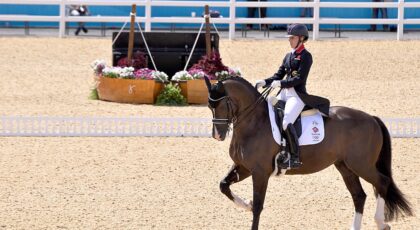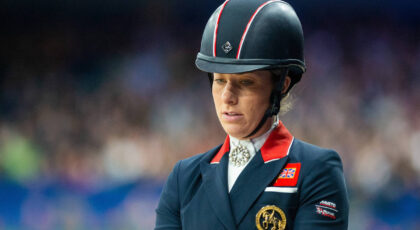NOBLESVILLE, INDIANA—On the eve of his retirement from the hunter/jumper industry, horse trainer Bobby Smith reflected bitterly on the current state of the sport from a dimly lit corner booth in his favorite greasy spoon.
“Things are not like they used to be,” lamented Smith, 72, sipping a piping-hot cup of black coffee as he absently tapped his pack of Marlborough Reds on the lacquered table in front of him. “Back when I began this thing, the industry was a lot more fun. The jumps were big and real, and so were the people. The snowflakes stayed at home, you know what I mean?”
After a lifetime following the midwestern grand prix circuit from St. Louis, Missouri to Franklin, Tennessee and up to Chicago and Ohio, Smith said he’s had his fair share of highs and lows—some in the same weekend.
“A few years ago, I won the Grand Prix at Brownland Farm on Saturday, and on Sunday, my horse pitched me into the third jump on course—the Whole Foods oxer. I shattered my right leg and broke my collarbone and two ribs; I still have 11 screws in my ankle,” he said proudly, tapping a boot.
“You should see, when I go through security at the airport, I light up like a Griswold Christmas!”
When pressed about what exactly irks him about the evolution of the hunter/jumper discipline, Smith pulled hard on his cigarette. His eyes grew wistful.
“Once upon a time, this was a real man’s sport,” he reflected. “And you know, I’m not one of those who says a woman’s place is in the home, barelegged and pregnant, or whatnot. But when I was coming up, we had some real heroes on the U.S. Show Jumping Team. Some guys you could really look up to.
“We were less concerned with this affirmative action, or 50/50 representation, or whatever it’s called. Nobody had to sit out a season because they were postpartum, or their horse wasn’t feeling 100 percent, or their sports therapist couldn’t make the trip overseas to Aachen, and they couldn’t get around the Nations Cup without having a good cry first.
“Back then, we put up and shut up, and so did our horses,” Smith continued. “And there just might be something to that. You know who was on the podium at Nations Cup Finals last year in Barcelona? Three European teams. And do you want to know how many women were on those teams?” Smith asks conspiratorially, raising his eyebrows. “Zip-zero my friend.
“I’m not saying there’s a correlation there. All I’m just saying, is have a look at the results.”
Suddenly, a wracking coughing fit interrupted Smith’s thoughts.
“Happens every so often!” he joked with a final hack, dabbing at his mouth with a napkin and leaning back in the booth.
“When I was still showing on the circuit, my grooms knew what to do. They’d have a little nip waiting for me at the ring when I got done with my first round, and they’d wipe my forehead, and clean 20 stalls before 5 a.m., and nobody said a word.
“They were just happy to be here, doing the job—having a job. Now, we’ve got organizations telling us how many hours our guys can work, and what we’ve got to pay them, and how we gotta help them get their Medicare, and all this nonsense. A codger like me? I’m just over it. It’s too late for this old dog to learn new tricks,” Smith said.
“That’s why I like this place,” he continued, lowering his voice and giving a wink to the unamused waitress refilling his coffee cup. He bent to light another cigarette and exhaled, slowly.
“If you know the right people, they still let you smoke in here.”




 April 21, 2023
April 21, 2023 




























